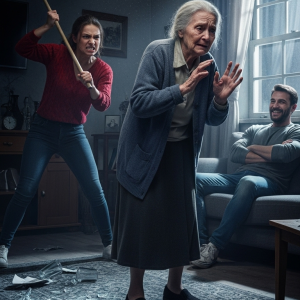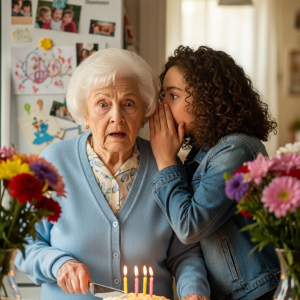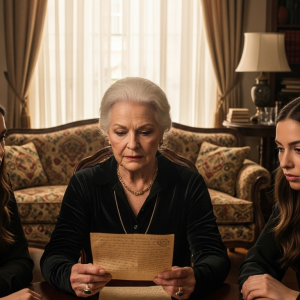He slapped me and then he walked away. For five years, there was not a word, not a call. But at my husband’s funeral, he showed up. Polished shoes, a black suit, and papers demanding half the ranch. I froze, not from shock, but from a pain so deep it felt like recognition. In that moment, I realized being a mother was the only thing I had ever clung to, and it had made me forget who I was.
I’m Lorine Brightmore. I’m seventy now, and I’ve lived most of my life on this land—1,200 acres of walnut trees and rolling hills where the fog settles soft in the morning like a memory. People call it peaceful. But peace, I’ve learned, is not always quiet.
My husband, Kenneth, and I built this place from nothing, just two kids with a beat-up truck and a handful of seeds. For four decades, this ranch was our proof that two people with grit and patience could shape the land and leave something behind. We had one son, Jasper. He grew up with dirt under his fingernails, and I thought he loved this land as we did.
But dreams change. In high school, Jasper started calling the farm “your thing,” as if it were a burden we’d forced on him. He left for the city like the earth was something to escape. Kenneth said to let him go, that he’d come around. For a while, I believed that. I kept his room ready. I reread his last text more times than I’ll admit. He hadn’t even signed it with love. Just Jasper.
It happened on a Tuesday in late October, the kind of night when the wind makes the walnut leaves scrape across the roof like whispers. We heard a truck coming up the gravel drive, the engine too fast. Even after five years, I knew that sound. It was Jasper.
He slammed the truck door and walked in like he still lived there, his boots leaving mud on the floor. He wore a leather jacket he would have once laughed at. His eyes didn’t look at me; they looked past me, right at Kenneth. He tossed a manila folder onto the kitchen table. “I need to talk business,” he said. “I have an offer.”
Inside were papers for the sale of half the property to an investor. Jasper wanted to split the proceeds. He started pacing, talking about his student debt, his bills, how city life was harder than he’d thought. “Besides,” he said, his voice sharp, “you don’t need all this land anymore. It’s too much for two old people to manage.”
I told him we weren’t selling. That this land was everything. That we would help him if we could, but this wasn’t the way. That’s when his voice rose. He accused me of always siding with his dad, called us selfish, said we owed him. Then, without warning, he slapped me. The sound wasn’t loud. It was sharp, sudden, and absolute. My cheek burned. My ears rang.
Kenneth stood up so fast his chair toppled over. He didn’t shout. He just moved between us, looked Jasper straight in the eye, and said with a calm, steady voice that he needed to leave. Jasper didn’t argue. He just turned and walked out, his truck speeding off into the dark. What lingered in the air was heavier than pain. The next morning, Kenneth boxed up every one of Jasper’s belongings. Just like that, our son became a memory we no longer knew how to hold.
The morning of Kenneth’s funeral was colder than expected. We held the ceremony in the orchard, just a small group of neighbors and friends. I stood by the closed pine casket, my hands steady, my voice clear as I read the letter he’d left me. I hadn’t let myself cry yet.
We were nearly done when a sleek black car, too polished for these parts, crunched up the gravel path. The door opened and Jasper stepped out. He was five years older, clean-shaven, wearing a black wool coat designed to make a statement. A woman in high heels and a man with a briefcase followed him.
Jasper waited until the final prayer was spoken. Then he stepped forward, not to touch the casket, but to turn to me. He nodded once, like we were two people in a business meeting. The man with the briefcase handed me a document. It was a legal notice. Jasper had filed a claim against the estate.
He was demanding fifty percent of the property, the back half of the orchard, and all operational equipment. He claimed he was the rightful heir. The woman with him, his partner perhaps, gave a tight, satisfied smile. This was going exactly her way.
“It’s just business,” Jasper said quietly. “We don’t need to make it ugly.” Then, he turned and walked away, leaving the papers in my hand, leaving me standing by my husband’s grave. The people who had stayed to support me now avoided my eyes, trickling away one by one. The part that finally broke me wasn’t the lawsuit. It was how natural the coldness looked on him, as if the boy who once ran barefoot through this orchard had never existed at all.
The morning after the funeral, I stood in the orchard, waiting for the quiet to tell me what to do. The legal documents sat on the kitchen table, a declaration of war from my only son. That evening, I drove to see our lawyer, Bruce Langford. He was retired, living in a house full of windchimes.
I handed him the envelope. He read every page, his lips pressed into a hard line. He asked when Kenneth had last updated his will. I told him it was two years ago, after his first surgery, tucked away in our fireproof box.
Bruce exhaled slowly. He said a valid will meant Jasper didn’t stand a chance, but he warned that Jasper could still contest it, claim we had manipulated Kenneth. I drove home through the fog, a new kind of resolve settling in my chest.
Back in my office, I found the will. Kenneth’s neat, deliberate handwriting filled the pages. He had left everything to me—every acre, every tool, every dollar. Jasper’s name wasn’t mentioned once. I remembered the day Kenneth wrote it, how he couldn’t bring himself to say the words out loud. I was the one who had typed them up.
This wasn’t how I imagined protecting our ranch. I opened another drawer and pulled out my old journal. Inside, I found the entry from the night Jasper struck me. I had written down every word, every detail, the way his eyes avoided mine. I made a copy of the will and a copy of that journal page. If Jasper was going to take this to court, I would be ready.
Three days later, the first official letter arrived from Jasper’s lawyer. I didn’t flinch. I brewed coffee, sat at the kitchen table, and highlighted every clause, every deadline. Bruce came over that afternoon, his focus sharp. He said Jasper’s lawyer was aggressive but sloppy. We worked through the night, reviewing Kenneth’s medical records, his will, and even a voice memo he’d recorded for the county, confirming his intention to transfer full ownership to me.
Later that week, I went into town for supplies. The way people looked at me had changed. Some nodded with sympathy; others avoided my eyes. At the hardware store, Margie Latimer pulled me aside. She asked if it was true, that Jasper was suing me. I told her I couldn’t speak on it.
Her eyes softened. She pressed her hand over mine. “I always wondered why he stopped coming around,” she said. “I remember him as such a sweet boy once.” I didn’t know how to tell her that the boy was gone, or that perhaps I had poured more love into him than he ever knew what to do with.
When I got home, the fields were golden in the low afternoon light. I stood at the edge of the orchard and looked out over the rows of walnut trees, steady and quiet. I realized then this fight wasn’t just about land. It was about memory. It was about who gets to decide what this place meant. And I knew I wasn’t going to let Jasper rewrite our family’s story. Not in court, and not in the whispers around town.
The formal notice of proceedings from the probate court arrived on a Tuesday. Holding the envelope with the court date typed in block font, I knew I wasn’t just defending the ranch from Jasper; I was reclaiming it for myself.
The next morning, I called Sharon Ditsch. She used to work for me during harvest season before she started a business helping family farms file for nonprofit protections. I told her everything. She listened, then asked a question that stopped me cold: “Have you ever thought about preserving the land through a legacy trust?”
As she explained how it worked, I felt something shift. The trust would remove the ranch from private inheritance, protecting it as a place for agricultural education and historical preservation. I would still live here and manage it, but when I passed, it wouldn’t go to an heir. It would belong to the land itself.
I asked her to send everything. I read until my eyes hurt. That weekend, I met with Bruce in the barn office. He was skeptical at first, but the more he read, the more he nodded. “It’s bold,” he said. “It will spark noise.” But he didn’t say no. I had already decided. If Jasper wanted a fight, he would get one, but not on his terms. I wouldn’t play the bitter mother in a courtroom. I would simply remove the prize.
The paperwork for the land trust took three weeks of quiet, deliberate work. I told no one. On the final day, the ranch was officially transferred to the Whitaker Agricultural Trust, named after my mother-in-law, who first taught me how to prune the trees. From that moment on, the ranch could not be divided or sold for profit. It belonged to a mission.
The court date arrived on a cold Thursday. Jasper was already there, his face a blank mask. We didn’t speak. His lawyer went first, painting Jasper as a misunderstood son seeking fairness.
Then Bruce stood. He didn’t argue. He simply handed the judge the land trust certificate, the notarized will, and the memo Kenneth had recorded. He explained that the property was no longer subject to private claim, that it now served a greater purpose.
The judge nodded, took notes, and added the documents to the record. It was over in minutes. Jasper looked at me for the first time, his jaw clenched, confusion in his eyes. He had expected me to break. I hadn’t. We left the courthouse in silence. At home, I boiled water for tea and watched the light change over the orchard. The air smelled like purpose.
Two weeks after the hearing, an unstamped envelope appeared at my door. It was a letter from Jasper, his handwriting rushed and slanted. It wasn’t an apology. He was shocked, he wrote, that I had taken something from him that was supposed to be his by blood. He said he’d taken out a loan in anticipation of winning and was now stuck. “You burned the bridge between us for good,” he wrote.
I didn’t cry. I went to the attic and found a tin of his childhood drawings—crooked tractors and stick-figure farm animals. That boy was gone. The next day, I mailed a letter of my own. I told him I understood his anger, but I had protected the land because it was the only thing left that hadn’t been twisted by bitterness.
The following week, Sharon and I sat at the picnic table behind the shed, watching volunteers from the ag program lay out soil samples. The trust was working. Students were visiting, and local growers were signing up for workshops. Sharon asked if I wanted to give a talk on walnut cultivation. I hesitated, then nodded.
Standing in front of fourteen people in the barn, speaking about soil cycles and pruning techniques, something inside me returned. Not pride, but steadiness. Afterward, a young woman with dirt under her nails asked if she could help prune next season. I told her she could start sooner. Something good had taken root here again, and I intended to keep it growing.
A knock came at the door near dusk. It was Jasper. He stood with his hands in his pockets, shoulders hunched. I stepped aside and let him in. He sat at the kitchen table, in the same chair Kenneth always used.
He pulled a folded paper from his pocket. He was dropping the appeal. His lawyer had told him the land was untouchable. He went on, his voice tired, explaining that the loan had caught up with him. He’d had to sell his place and was now staying with a friend.
When I asked why he came, he paused. “Maybe curiosity,” he admitted. “Maybe guilt. I thought you’d crumble after Dad died. I thought you’d be too overwhelmed to fight back. But you weren’t.” He asked if he could help with something, anything, even just sweeping the barn floor.
I thought about all the versions of him I’d carried over the years. Finally, I told him there was a row of tools that needed sharpening. He nodded, then stood and walked outside without another word. I watched from the window as he moved across the yard, his steps slow, unsure, but they were his. I didn’t know what would happen next, but I wasn’t doing this for him anymore. I had built something rooted, and now it would outlast the noise.
Jasper started showing up in the mornings, quietly, like someone testing if a door would stay open. He turned the compost pile, cleaned the shed gutters, never touching the house. He kept to the outer buildings, the edge of things, and I let him.
One afternoon, I caught him reading a binder about the trust’s spring curriculum. He didn’t say anything, just asked if we still had the old soil pH tester. Later, he asked about Kenneth’s last harvest. It was the first time he’d said his father’s name since the funeral. I told him the truth: that it had been slow, and that Kenneth had gotten his wish to pass away on his own land.
The next morning, a package arrived from a bookstore. Inside was a rare agricultural memoir Kenneth had always wanted. Tucked in the cover was a note from Jasper: I remembered. I didn’t thank him, but I noticed he lingered a little longer each day. A week later, I saw him showing a young volunteer how to properly use the irrigation lines. I heard her laugh.
That night, I sat with my tea. There was no grand moment of forgiveness, but something quieter had taken root. I had not opened my arms, but I had left the door ajar. And Jasper, for the first time in years, was walking towards something instead of away from it.
By January, the ranch had slowed to its winter pace. Jasper was still around, often enough that his absence now felt unusual. I saw him showing Nora, a high school volunteer, the right angle for clean pruning cuts. He was patient, his instruction clear.
Sharon sent a request from a rural revitalization program; they wanted to feature the ranch as a case study. A photo was attached, taken during a fall workshop. Jasper was in the corner of the frame, carrying a crate of tools. I wrote a short piece about what happens when something broken is repurposed. The board accepted it for their spring report.
I gave Jasper a copy. He read it without speaking, then set it down carefully. He stayed for dinner that night, the first time in years. We didn’t talk about the past. We just ate. The old radio station played softly. It wasn’t closure, but it was something steady, something honest. When I went to bed that night, the ache I’d grown used to carrying had softened.
By early spring, the land began to hum with life again, and so did I. The workshop season picked up, with more volunteers and more lessons. Jasper didn’t move back in, but he stayed close, fixing what was broken, replacing what had worn thin. He laughed once, a quiet sound that carried across the barnyard.
On the first of May, I was in the southern plot planting new seeds. The sun was sharp, the breeze steady. I worked with my hands, just as I had done for years. But this time, I wasn’t alone. I stood back and looked over the land, and it no longer felt like something I was keeping alive. It felt like something that was keeping me alive.
I hadn’t forgiven everything. Some wounds don’t close the way we want them to, but they stop bleeding. This wasn’t a neat ending, but it was the right one, built on quiet, daily choices. It was a life that would continue to grow, even when no one was watching. And that, I had finally learned, was more than enough.




